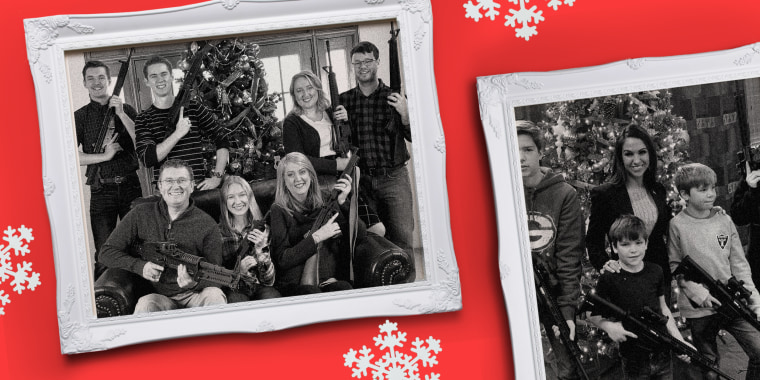Some prominent Republican lawmakers have been delighting in sharing a new kind of Christmas card ritual: arming their family to the teeth for a festive photoshoot in front of the Christmas tree.
Last week, Rep. Thomas Massie, Republican of Kentucky, tweeted a photo of his family all holding firearms, which, according to The Guardian, resembled “machine guns and semi-automatic weaponry, some of which are made to look almost identical to fully automatic weapons.” Then on Tuesday, Rep. Lauren Boebert, R-Colo., tweeted a photo of herself and her four young sons, each son bearing their own large gun in front of a Christmas tree.
Massie, and then Boebert, were swiftly panned by critics on the left for, among other things, sending out photos of children brandishing guns just days after investigators alleged a teenage school shooter in Oxford, Michigan, in the deadliest U.S. school shooting in years, killed four students and injured more.
But the images Massie and Boebert tweeted weren’t merely insensitive: They were bold political and cultural statements. The style of the guns, their size, the number of them and the fact that they were being held by young children displayed a disturbing vision of family and safety — one that speaks to a zeal for guns that exploits the right to bear arms as part of a right-wing culture of everyday militance. That culture, which is racialized in nature, in turn makes our society less safe — and helps create fertile soil for extremist violence.
The power of these images lies not just in the guns but in who can wield them with cultural impunity, and toward what end.
One striking feature of Massie's and Boebert's Christmas cards is the distinct cultural milieu they reflect; it’s hard to imagine people from other racial, ethnic and political backgrounds pulling off something similar without right-wingers depicting them as monstrous. Had a Muslim family sat before a mosque holding up huge guns, the image may have gone viral in conservative social media circles as a symbol of imminent Shariah; had a Black family dressed as Nation of Islam devotees waved big rifles in a holiday card, the photo probably would’ve been deemed a sign of a coming race war against whites. Even if these other hypothetical families were exercising legal rights to bear arms, they likely would be characterized as threats rather than champions of American gun culture. (It bears noting that in the 1960s, Republicans in California — including Ronald Reagan, who was governor at the time — supported the passage of a gun control law in response to the Black Panthers’ use of guns in public.)
In other words, the power of these images lies not just in the guns but who can wield them with cultural impunity, and toward what end.
On the latter point, these photos speak to a troubling kind of cultural and political outlook.
I don’t own a gun, and I think America would be much safer if it disarmed like Australia or regulated guns like Japan. But let’s make some distinctions here about American gun ownership. Hunting culture makes a great deal of sense to me; I respect it as a cultural tradition, and given how unethical our livestock industry is, I think responsible, ethical hunting is a defensible pursuit. And if one lives in an area in which it feels necessary to store weapons for self-defense, perhaps due to living in a remote or distinctly unsafe place, I am sympathetic to the desire for a gun that is stored carefully, even though there is data that suggests the safety they provide is questionable.
But it’s another thing entirely to stock up on weapons which are manifestly not for hunting or a last resort for self-defense, but in fact designed for law enforcement and military personnel to severely injure and kill people with extreme speed. Moreover, accumulating these kinds of killing machines and encouraging children to view them with casual delight is a recipe for prompting minors to misuse them. Consider that a prosecutor said the Oxford shooting suspect was given his semi-automatic pistol as a Christmas gift, and that his mother instructed him to avoid letting his teachers see him buying ammunition online. Consider how Kyle Rittenhouse, who obtained his gun as a teenager and fatally shot two people at a protest against police killings, said he chose an AR-15 style, in part, because he “thought it looked cool.”
Massie and Boebert are helping normalize a spectacle of vigilantism that weaves the possibility of warfare into everyday American life. It’s incredibly dangerous.
It’s also politically expedient. Explaining on a radio show this week the logic of posting his photo, Massie said, “I crossed guns with family and Christmas, and those are three things that really could trigger the leftists, and I didn't realize that it would be such an explosive cocktail when you put it together. But it adds up to freedom.” Massie’s claim that he didn’t expect such a response strains credulity; trolling the opposition as a way to generate attention and name recognition has become a norm since the Trump era.
But more disturbing still is that it represents his — and many of his allies’ — vision for freedom.

